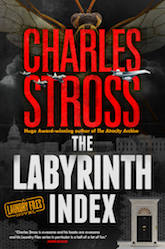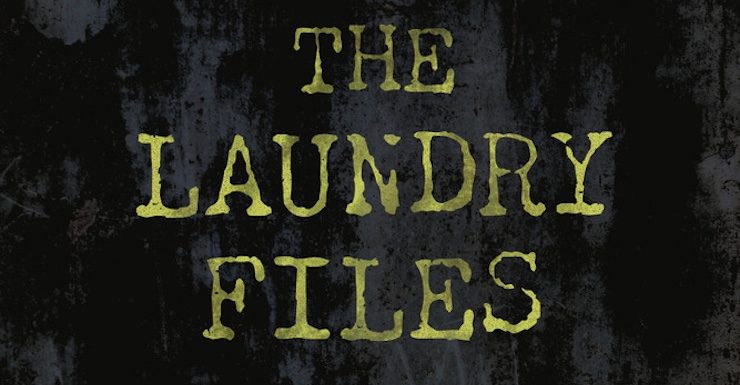The Laundry Files are a long-running series of stories and novels I’ve been writing since roughly 1999. Today marks the publication of The Labyrinth Index, the ninth novel in the sequence.
This is your five-minute orientation briefing before Human Resources take over for your induction paperwork. Please try to pay attention: there won’t be an exam, but your life may depend on it.
The “Laundry”—or, more formally, X-Division of the Special Operations Executive—is the British government organisation responsible for defending the nation against emergent magical threats. As a branch of applied mathematics, magic was practiced on an ad-hoc basis prior to its systematization by Alan Turing in the 1940s. Wartime efforts combined the approach of GCHQ (cryptanalysis, applied computational demonology) and SOE (sabotage operations, combat philosophy) and led to the establishment of the post-war secret agency documented in these classified publications.
Members of staff assigned to Active Operations are required to maintain a journal describing their operations, so that in event of their death or assimilation by an extradimensional nightmare their knowledge is not lost to the organization. As a new recruit you are encouraged to familiarize yourself with these classified sources: they’re an invaluable learning resource and the following reading list may prove helpful.
Getting started: what’s this all about, anyway? We suggest the early diaries of Robert “Bob” Howard, from his early years as an IT technical support specialist to his engagement in active operations. These are collected in The Atrocity Archives, The Jennifer Morgue, The Fuller Memorandum, and The Apocalypse Codex and may give you some idea of the scale of threats an agent is expected to face, from counting concrete cows in Milton Keynes (with explosive consequences) through being held prisoner on a mad billionaire’s yacht as he tries to use the ghost of a dead monster to take over the world, to uncovering a cult of worshippers of one of the Elder Gods so erroneously described by H. P. Lovecraft, a narrator almost as unreliable and self-deluding as Bob Howard himself.
Along the way, Mr Howard learns about CASE NIGHTMARE GREEN, the Laundry’s plan for managing the impending Lovecraftian Singularity caused by the proliferation of computing machinery (including human brains) eating holes in the structure of reality. This is a runaway positive feedback loop, for as it proceeds magic becomes easier to practice, and an increasing number of uncontrolled magical phenomena intrude into our world, from amateur sorcerers discovering hitherto untapped powers, to the emergence of godlike alien intelligences out of legend and nightmare.
Monsters: threats or opportunities? Bob discusses the military applications of unicorns in “Equoid” and confirms that vampires don’t exist (at least, not as far as people with your security clearance are concerned) in The Rhesus Chart. In The Annihilation Score, Bob’s long-suffering wife Dr Dominique O’Brien describes her assignment to tame the menace of uncontrolled superheroes on behalf of the Home Office by setting up and managing the Transhuman Police Coordination Force—a vital look at the senior civil service management approach to interfering civic volunteerism and mad science. And in The Nightmare Stacks Dr. Alex Schwartz vividly describes the psychology (inarguably psychotic) and military doctrine (lamentably effective) of Elves, with specific reference to the combined-arms force that invaded West Yorkshire in 2014.
Politics and the New Management: the loss of a major city and several airliners surpassed the ability of the Laundry to maintain the veil of secrecy, and resulted in a full Parliamentary enquiry and the adversarial restructuring of the agency. As a mid-level executive Mr. Howard had a close-up view of the ensuing disaster, which he documents grippingly in The Delirium Brief, including the agency’s response to the Prime Minister’s ire (install a more thaumaturgically aware Prime Minister). With contributions from other operatives (including Dr. O’Brien, Dr. Schwartz, Ms. Persephone Hazard, and Ms. Murphy from Human Resources) Mr. Howard provides a solid account of the crisis leading up to the establishment of the New Management.
Buy the Book


The Labyrinth Index
Finally we come to the most recent report, The Labyrinth Index. In this document Mhari Murphy—newly elevated to the House of Lords in order to chair the Select Committee on Sanguinary Affairs—describes what it is like to work for a government of national survival in a time of crisis. Assigned a special project—determining what exactly has overcome the United States of America, and what to do about it, at least insofar as another government ought to get involved—she gives a unique personal view of our new Prime Minister’s genius in action. She also provides valuable insights into life as a vampire (urban fantasy yarns turn out to be a terrible guide), the true magnitude of CASE NIGHTMARE GREEN, and the US administration’s drastic approach to managing the Lovecraftian Singularity.
These documents were formerly covered by a top secret codeword classification. However, they have been declassified and published (subject to redaction of still-secret details) by order of the New Management, in order to assist interested members of the public in understanding the necessity of the coming sacrifices. We hope you will enjoy them, or at least find them a valuable use of your remaining time before the stars come right and the rest of the Elder Gods return to eat our souls.
All glory to the New Management!
Long may the Black Pharaoh reign over us!
Rule Britannia!
Iä! Iä!
Charles Stross was born in Leeds, England, in 1964. He has worked as a pharmacist, software engineer, and freelance journalist, but now writes full-time. To date, Stross has won three Hugo Awards and been nominated twelve times. He has also won the Locus Award for Best Novel, the Locus Award for Best Novella, and has been shortlisted for the Arthur C. Clarke and Nebula Awards. The Labyrinth Index, the latest novel in the Laundry Files series, will be available from Tor Books and Tor.com Publishing in October 2018. You can visit his blog, follow his Facebook page, or find him on Twitter at @cstross.










